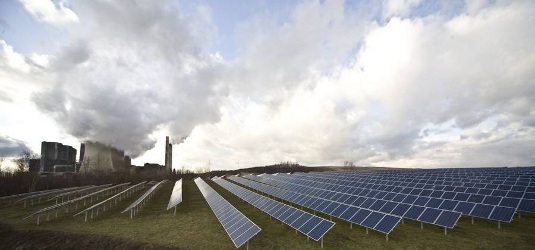David Hostetter
Following the 2011 Fukushima disaster in Japan, German Chancellor Angela Merkel announced the closing of the country’s nuclear reactors. In need of an around-the-clock energy source to back up the fluctuating output of wind and solar plants, Germany has turned to coal. Nobody likes the exorbitantly long-term nuclear waste disposal process, the difficulty involved in ensuring its isolation from the biosphere, or the environmental implications of radioactive waste getting into ecosystems. These are better reasons to close reactors than any perceived tsunami threat in northern Europe. However, in the midst of a growing climate crisis, carbon is the name of game, and the new 2,200 mega-watt coal-fired Cologne-adjacent plant will emit in one year “over one million times more carbon … than all of [Germany’s] nuclear plants would have over the next 20 years”. After dumping nuclear, Germany needed a way to make up for the dearth in energy supply that didn’t bankrupt its poorest citizens, and coal’s frugal reputation made it an attractive suitor.
This purportedly falls, oddly, under the rhetoric of a transition to renewables. While it’s true that some sort of economically-accessible non-renewable will have to be temporarily relied upon in order to reach the goal of phasing out all nuclear by 2022, Germany’s apparent climate-friendly stance on energy should, if it is serious, entail something other than infamously carbon-intensive coal. Energy policy professor at the University of Oxford, Deiter Helm, argues that if Germany is actually committed to the climate, it would favour gas over coal as a transitionary fuel. Given the collapse of carbon permit prices in Europe over the past year (a drop of 43%), coal is much less costly to burn, and Germany’s two largest utilities, RWE and EON, are naturally following the money. Of course, the coal plants being developed are the cleanest out there. But for coal, that’s not saying much. They still produce 1.5 to 2 times as much carbon dioxide as gas plants and, with cheap coal-fired electricity surging into the market, gas plants could lose economic viability and be shunted out in favour of more coal.
According to James Conca of Forbes, the existence of cheap nuclear energy was the only economically feasible way to implement their Renewable Energy Act (EEG). Consumers and business required and affordable energy supply in order to transition into the new carbon requirements of the EEG. We are now witnessing the paradox of the Merkel government’s ‘pro-renewable’ energy policy: a projected increase in carbon production as well as the associated environmental hazards of mining new coal. This is the danger of a staunch anti-nuclear stance on the side of environmentally-minded activists and politicians. Carbon mitigation is the central issue in the fight against climate change. The German government is releasing more carbon dioxide into the atmosphere in the name of eventually emitting less, and this in order to make up for shutting down low-carbon plants that were in position to ease the economy into that change already. Such action is imprudent in the short and long-term. It sets Germany up for a more carbon-intensive energy sector for the foreseeable future and in the mean time fuels anti-renewable-policy claims that government mandates on clean energy are ineffective.

